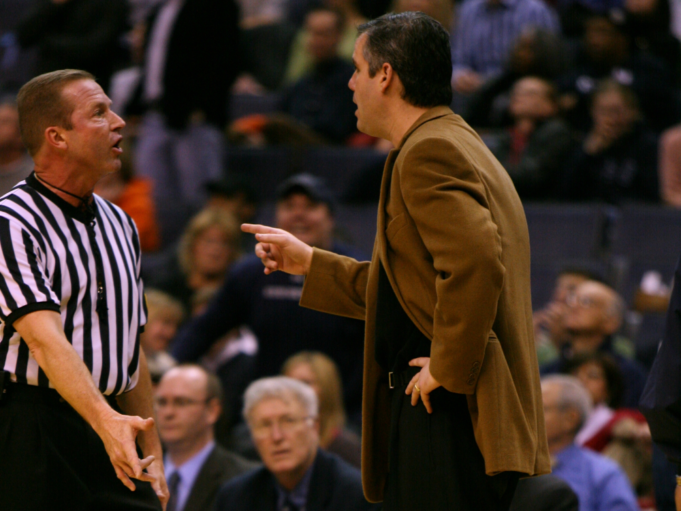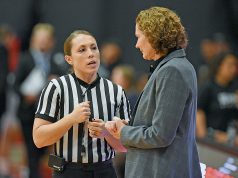Comments from head coaches, their coaching staffs, team supporters and fans can vary and deserve a multitude of responses. But when the comments go from noise to unprofessional conduct, officials have a responsibility to address it — using both management skills and the rules to establish a return to civility.
When it comes to dealing with non-playing participants in any sporting event, the difference between noise and unprofessional conduct must be clear in an official’s mind.
Officials should establish their own line ahead of time as the emotions of a game or specific comment can be a trigger that has a specific negative effect. You must have absolutes that you won’t tolerate and non-absolutes that you will allow and treat fairly and evenly.
Most of the absolutes can be established with the rulebook as a guideline. Profanity is an absolute — it is unprofessional at best and disrespectful at its worst. Non-playing participants cannot be allowed to use profanity. They should be dealt with swiftly and succinctly — yellow cards, technical fouls and unsportsmanlike penalties are among the examples within the rules. For team supporters, direct and immediate referral to game management is the best option.
What makes the difference between “noise” and “unprofessional conduct” should be a personal determination by the official. There are few absolutes (perhaps only profanity) that might be worthy of a sanction.
However, there are many types of conduct exhibited by non-participating personnel that can fall close to either side of the line. Officials need to ask themselves what they will tolerate and then remain true to the standard. Consistency in applying those standards will make the official’s role in applying his or her standards simpler when the heat is turned up.
Here are some questions for an official to consider when establishing his or her own “noise vs. unprofessional conduct” policy.
- What words are on your own list of profanity? Is your own vocabulary and tolerance for others’ use of words close to the standard of the community in which you are serving as an official? Does officiating in a gym that’s affiliated with a parochial school make a difference in what you’ll allow? Should it?
- What types of non-verbal communication will you tolerate? Will a certain type of body language be permitted in one sport, but not in another? Can body language have different meanings to you than the person delivering the message?
- Does disregarding a directive from a game official once warrant a second chance? Does your policy have an elasticity that comes with the game situation? Do you treat something that would be unprofessional conduct in the early stages of a game as noise late in a game, fearing your call might impact the outcome?
Let’s look at a few situations that might help get your thinking started on how you’ll answer those questions.
Words have definitions found in Webster’s Dictionary, and words have meanings that can be close to universal. They are not necessarily the same thing, and it’s your job to sort that out.
Late in a soccer game, a head coach yells, “What kind of frigging call is that?” as the referee points for a free kick. In the closing moments of a football game, the offensive coordinator shouts, “Are you freaking kidding me?” when no flag is thrown on a potential pass interference play.
Both italicized words are being used as substitutes for a more profane word. However, if penalized, the speaker of the words would declare that he or she had not uttered a profanity. Yes, the gentler words could be deemed as offensive toward the official, but probably fall on the side of noise.
When the moment settles, the official’s best choice might be to simply tell the speaker, “You can use a better choice of words.” Most often, the speaker will retreat from the remarks, recognize that the official has made an effort to defuse the situation and move toward resolution.
Should the speaker return to the language again, it’s time to say, “I’ve asked you, now I’m telling you to use better words.” And while it should remain unspoken and never threatened, the speaker now has two strikes and a penalty looms on a third offense.
Midway through the first quarter, a coach rises from the bench and receives an explanation of a traveling call from an official. As the official walks away, the coach gives a dismissive wave. Many basketball officials consider that an absolute example of unprofessional conduct, so much so that partners will often call the technical foul if it’s done behind the official’s back.
That is unprofessional conduct. Coaches deserve explanations occasionally. The official’s explanation must be respected — even if not agreed with or understood. Conduct like that would not be accepted in any professional environment from the boardroom to the checkout lane. The conduct should be penalized.
Same game, but this time in the third quarter, the other coach stomps his or her feet as the opposing team takes the ball from his or her offensive frontcourt toward its own basket following a steal. There was contact during the steal, possibly either a foul that was not called or contact that was ignored by rule. The calling official does not see the stomping, but definitely hears it.
Most often, that is noise. The coach is reacting to the play, primarily in frustration over the turnover. Any game is emotional, especially for the non-playing participants who have hours of coaching work invested in the outcome. A spontaneous and even demonstrative reaction can be tolerated; if it’s a “missed” call, even more, leniency can be applied by the officiating crew.
Non-verbal communication is much more difficult to be certain about. Be cautious in penalizing it. Yet always know when a non-playing participant is “looking at you in that tone of voice.”
Officials are hired to do a job — administer the game by an agreed-upon set of rules. Without the rules, we have little purpose. Still, non-playing participants often attempt to bend those rules. Worse yet, bending those rules has become an accepted practice in other games for them and they are not about to stop.
Recently, a youth football coach was asked to remain out of the restricted area during the opening kickoff. In his own unique form of protest, the coach stood on the playing field during the kickoff return. When a penalty flag flew, his jaw was agape as he commented that the restricted area had not been enforced all season.
That is also unprofessional conduct. It’s a direct and intentional violation of the rule. Defiance of a request to comply sends a strong message from the coach that he is not treating an official as a peer. A message of non-compliance needs to be dealt with immediately and firmly.
What's Your Call? Leave a Comment:
Note: This article is archival in nature. Rules, interpretations, mechanics, philosophies and other information may or may not be correct for the current year.
This article is the copyright of ©Referee Enterprises, Inc., and may not be republished in whole or in part online, in print or in any capacity without expressed written permission from Referee. The article is made available for educational use by individuals.



















